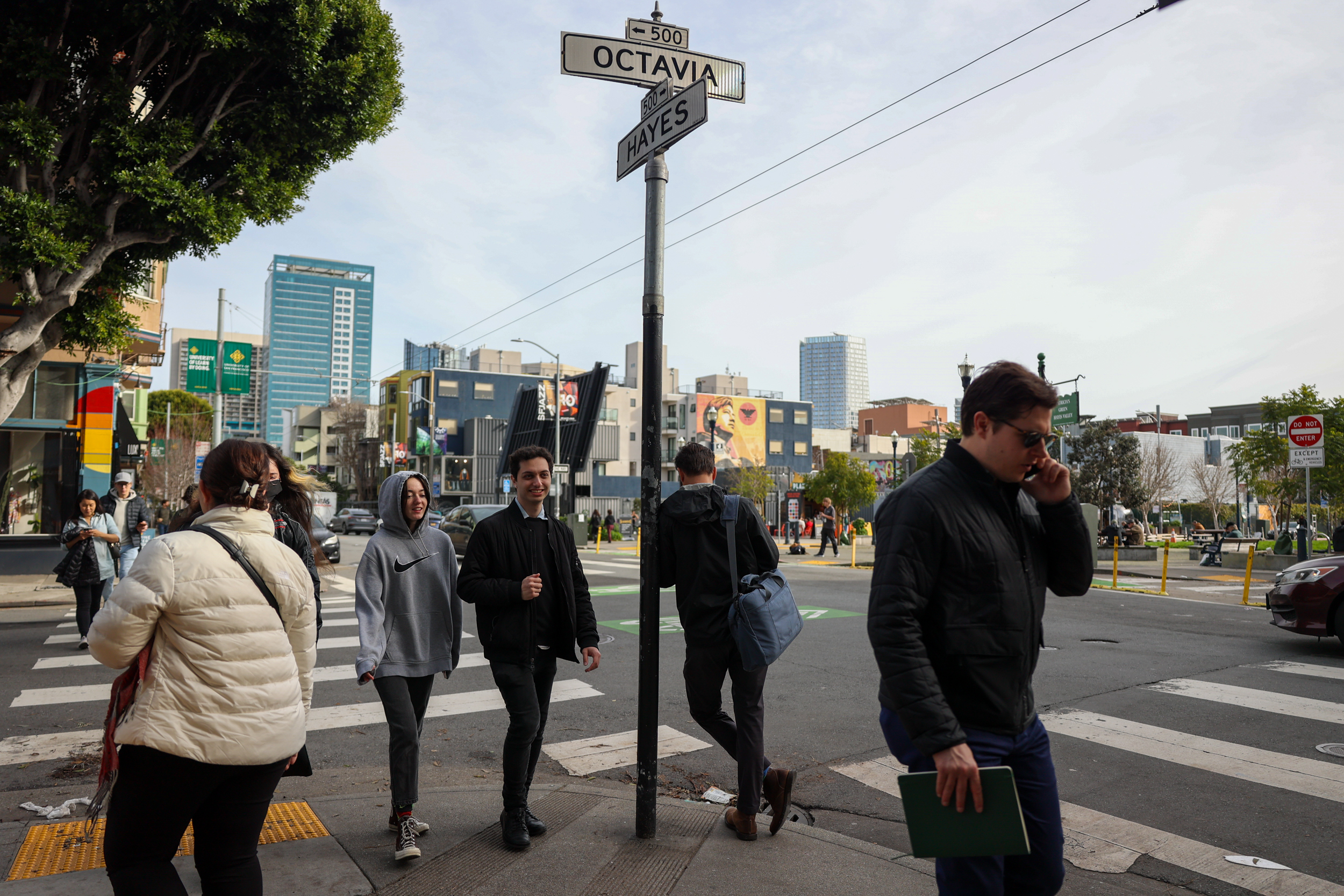Nearly three years of car-free Hayes Street will come to an end after this weekend.
The program, called “Shared Streets,” will wind down because the city decided against renewing the permit that allows the street closure, according to Lloyd Silverstein, who leads the Hayes Valley Merchants Association.
The permit allows Hayes Street between Octavia and Gough streets to close to cars from 4 p.m. to 10 p.m. on Fridays and 10 a.m. to 10 p.m. Saturdays and Sundays. The program began in August 2020 and stretched three blocks from Laguna to Franklin streets when it launched.
Silverstein said the San Francisco Municipal Transportation Agency told him Wednesday that the permit would not be renewed.
“Shared Streets is vital to qualify of life and this commercial corridor,” Silverstein said. “To shut it down in the middle of the summer is unconscionable.”
Jen Laska, head of the Hayes Valley Neighborhood Association, said the street closure “really revitalized the area,” helped local businesses recover from the pandemic and made the street feel more vibrant.
The parklets in that area will not be affected by the end of car-free Hayes, as those are allowed under separate permits, according to Laska.
‘It’s Super Sad’
Businesses and locals were concerned about the program’s end, but some were more worried than others.
“It’s pretty disappointing,” said Anthony Healy-London, who owns Hayes Valley bar Brass Tacks and neighboring restaurant Anina. “We’re still coming out of Covid, and we’re trying to survive.”
But he stopped short of saying the end of the car-free street would spell doom for his businesses.
“I don’t think it’s, like, if we shut it down we wouldn’t survive,” Healy-London said.
Stephen Baker, manager at restaurant a Mano along the stretch of car-free Hayes Street, said the street closure brought more foot traffic to the area, but that he is not worried about the restaurant’s survival once the cars come back.
“I think it helped bring good business, but we’ll make it work no matter what happens,” Baker said.
Some retailers felt differently.
“It’s super sad,” said Monica Rodriguez, manager of The Epicurean Trader on Hayes Street. “It brings lots of customers and it stops crime.”
Rodriguez said the foot traffic drove a noticeable bump in sales, and with cars able to access her block, it will enable shoplifters to get away with stolen items from her store, which includes high-end liquor.
“That’s high risk for us,” Rodriguez said.
Customers and locals also had mixed feelings about the end of the car-free strip.
People sitting around the plaza near Patricia’s Green, a park near the block that turns car-free Friday through Sunday, said the end of car-free Hayes was unfortunate but that there’s still plenty of open space in that area without it.
“I always thought it was a nice idea,” said Rick Pierman, who has lived in Hayes Valley since 1979. “It was done during Covid, and that’s not a concern now, so they’re going back to the old ways.”
Mark Jansen, who lives in the Outer Richmond but frequently comes to Hayes Valley, said that opening the street back up to cars just didn’t make sense, and keeping it closed off would be better for pedestrians.
“It feels like these businesses were hit hard for Covid, it seems like keeping it open would be a net positive,” Jansen said. “It’s safer and it’s a better vibe.”
Supervisor Dean Preston sent a letter to the San Francisco Municipal Transportation Agency Monday urging the agency to reconsider the decision to end Shared Spaces on Hayes Street.
“Given the extensive benefits of this program, I believe the discussion should be about how/when to make this program permanent, and certainly not how/when to shut this down,” Preston wrote in the July 24 letter.
When reached for comment, Preston’s office sent a copy of the supervisor’s letter but did not provide further comment before publication. The SFMTA and the city Planning Department, which also runs the Shared Streets program, did not respond to requests for comment in time for publication.
Vague Concerns
Both Silverstein and Laska said the Fire Department mentioned concerns around emergency access to the car-free street during a March hearing about renewing the Shared Streets permit.
Silverstein said the SFMTA also mentioned concerns from local residents living outside of the car-free section of Hayes Street. But he said those concerns were never elaborated upon—even when the decision to end the street closure was handed down Wednesday. In his view, that lack of clarity robbed Shared Streets proponents of the chance to mitigate any safety problems or other issues raised by critics of the closures.
“We felt totally blindsided,” Laska said.
Silverstein also said he has closely adhered to a map the fire department sent to the merchants association in September outlining where to place cones and barriers to block cars while allowing emergency vehicles to access closed streets.
The SFMTA subcommittee that conducted the permit renewal hearing ended up postponing a decision on the permit renewal due to the concerns, before informing Silverstein the permit allowing car-free Hayes Street would not be renewed, ending the program.
“There had been zero communication,” he said.
Preston mentioned these concerns in his letter, and blasted the SFMTA as not being transparent.
“It is deeply concerning to see this program slated to be discontinued based on vague allegations of safety concerns, concerns our office is learning about third-hand and with no specificity,” Preston wrote.
When asked for comment about what worries drove the decision to discontinue the program, the SFMTA and the Fire Department deferred to the Planning Department for comment. The Planning Department, in turn, deferred to Preston’s office, which did not provide further comment before publication other than sending the supervisor’s letter.
